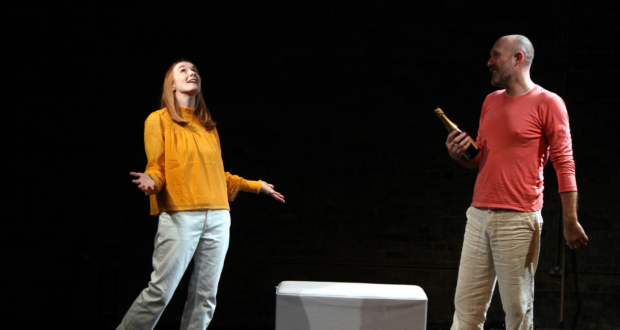Fringe theatre gives visibility to vital conversations. Discussing fertility and aging, Simona Hughes’ About 500 does exactly that, in one well-paced hour.Summary
Rating
Good
Clem (Stephanie Fuller) is thirty-six when she decides she wants to have a child. After spending her entire adult life avoiding pregnancy, she finds getting pregnant to be a challenge. Alongside struggling to get pregnant, Clem deals with feeling as though time is rushing away, scrutiny from others, and her own fears and judgements.
Simona Hughes’ script encapsulates years of Clem and her partner’s life together as they try for a child. Despite having a lot of time to cover, the play is well-paced, never rushing over moments; always allowing characters’ emotions to settle on the audience. Hughes’ direction supports this, as transitions between scenes build on previous action and continue the story. The recurring action of Clem picking up the small white drops thrown at the beginning of the show – those that had not been crushed underfoot in the first ten minutes, punctuating the celebratory opening with a reminder of the show’s focus on loss – is as emotionally weighted as the scenes fraught with anxious dialogue.
Time is the central theme to About 500 and is played with in scenes where the dialogue is performed out of chronological order, representing Clem’s battle with her ‘biological clock’ and highlighting the ongoing pressure it has on her. In a particular scene, this dialogue is paired with excellent movement direction (by Mandy Gordon), as Clem’s internal frustrations are played out in writhing discomfort. Movement is used well throughout, and the actors play adequately to three sides of the intimate auditorium.
Fuller shares the stage with Dickon Farmar and Joanna Nevin. The three are strong together, their interactions well-directed and meaningful and their portrayals convincing. However, Clem, Luke and Ruth do not feel like new characters, with exciting eccentricities or unique quirks. Perhaps this is a deliberate choice, to allow the subject matter that is being dissected to take centre stage and not be overshadowed by more vivid and exciting personalities. But this feeling – as though these people have been met in theatre or literature before – causes some moments to feel overacted. Fuller plays Clem with engaging gesticulation and evocative facial expressions, and Farmar and Nevin are clearly talented too, but it would be exciting to see their characters’ personalities taken further if they had more unique attributes to explore through their skills.
Underpinning the action is an aesthetic and functional set, comprised of multipurpose blocks that become tables, chairs, boxes, a bench, a bed. These are shifted and adjusted as needed, characterising scenes adequately without distracting from the larger action that demands our attention. Likewise, costume is colourful but simple, combining with the set to form a creative foundation for the subject matter discussed. These tools also hint at a child-like playfulness – the floor staining with the crushed drops, large blocks building the world, block colours – which reminds the audience of the constant pressure that weighs on the protagonist.
The play is also interspersed with documentary-style audio that reminds us of the many real experiences this show resonates with, and why it exists. These moments punctuate the story with a further layer of intrigue and emotion.
Through clever direction and dynamic storytelling, About 500 brings difficult and often unheard conversations about fertility to the stage, reminding us what fringe theatre is made for.
Written and Directed by: Simona Hughes
Produced by: Brucu Conn
Movement Direction by: Mandy Gordon
Dramaturg by: Melissa Dunne
Designed by: Nic Farr
Composed/Sound by: Jack Baxter
Lighting Design by: Ryan Day
About 500 plays at King’s Head Theatre until 23 April. Further information and tickets here.
 Everything Theatre Reviews, interviews and news for theatre lovers, London and beyond
Everything Theatre Reviews, interviews and news for theatre lovers, London and beyond



